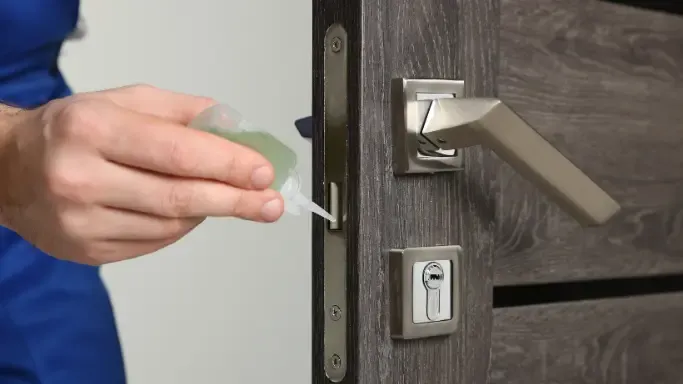When dealing with a stubborn lock, many homeowners instinctively reach for the familiar blue and yellow cans of WD-40. Initially developed to prevent corrosion on nuclear missiles, this multipurpose lubricant has become a staple in countless toolboxes and kitchen cabinets. For many, WD-40 seems like the perfect quick fix for noisy or jammed doors, thanks to its reputation as a universal solution.
However, professional locksmiths see things quite differently when it comes to using WD-40 on locks—and not in a positive light. While WD-40 might appear to solve the problem temporarily, it actually causes more harm than good. Even though it works immediately, the consequences can be detrimental over time.
Let's explore why this combination of WD-40 and locks makes locksmiths cringe.
---
The appeal of WD-40 for DIY lock maintenance lies in its convenience and accessibility. Many people opt for WD-40 because it’s readily available at hardware stores and supermarkets, making it an attractive choice for those who prefer to handle repairs themselves. At first glance, applying WD-40 appears to resolve the issue quickly—noisy locks quiet down, and the mechanism moves more smoothly. However, this ease of use comes at a cost.
WD-40 is not specifically designed for locks, and its oil-based formula poses several risks. Over time, the sticky residue it leaves behind attracts dust and debris, leading to long-term problems. While the immediate results might seem satisfactory, the damage accumulates gradually. As the lock continues to malfunction, homeowners may mistakenly assume they need another application of WD-40 rather than addressing the underlying issue. This cycle repeats itself until the lock becomes irreparable, necessitating costly replacements or professional intervention.
---
Professional locksmiths strongly discourage using WD-40 on locks due to multiple concerns:
1. **Temporary Fix, Permanent Damage:** Although WD-40 makes locks operate more smoothly initially, this improvement is short-lived. Its residue attracts dirt and grime, causing further complications.
2. **Residue Buildup:** One of the biggest risks of using WD-40 is the buildup of residue inside the lock mechanism. This accumulation damages critical components such as cylinders, pins, and springs, compromising the entire lock system.
3. **Corrosion and Wear:** WD-40’s oil-based composition can corrode metal parts and degrade plastic or rubber elements within the lock. Additionally, it interferes with proper lubrication, replacing essential lock-specific oils with substances that increase friction and wear.

---
To ensure your locks function optimally and last longer, it’s crucial to use appropriate methods. Instead of WD-40, locksmiths recommend specialized lubricants designed specifically for locks, such as silicone sprays or dry graphite powders. Unlike WD-40, these products provide effective lubrication without attracting dirt or leaving harmful residues.
Before applying any lubricant, gently clean the keyway using a soft brush or compressed air to remove any debris. Only apply a small amount of the recommended lock-specific lubricant, as excessive use can lead to issues. Regular maintenance with the right tools ensures your locks remain functional and secure.
---
In summary, while WD-40 may offer a quick fix, it introduces significant risks that can ultimately harm your locks. Avoiding WD-40 in lock repairs is just the beginning of proper lock care. Following expert recommendations consistently ensures your locks remain reliable and secure.
If you’re looking for professional assistance with lock maintenance or repairs, consider reaching out to Sure Lock & Key. Our team of experienced locksmiths specializes in lock care and can address all your door lock needs. From recommending suitable lubricants to providing thorough cleaning and maintenance services, we’re here to help you safeguard your home effectively.
Whether you need advice on choosing the right products, require professional lock cleaning, or face lock malfunctions caused by improper WD-40 use, trust Sure Lock & Key to deliver exceptional service. Your peace of mind is our priority.
Deck Lights
Deck lights provide a steady stream of light, improving overall visibility and providing additional security for commercial and residential premises.
LED deck light is made with integrated LEDs instead of bulbs, eliminating the need for frequent bulb replacements.These fixtures also have a longer life span, outlasting comparable HID and halogen fixtures.It is ranging from compact for smaller installations to broad stadium lighting.Compared to other landscape lighting, its most obvious feature is that it is mini size.
LED deck step lights can be used to create interesting shadows and outlines of objects, adding a unique element to any room. Available in symmetrical beam angles of 10â°/15â°/30â°/60â°/90â°/120â° and so on . Standard color temperature of 2700K-6000K available with an option of R/G/B/ ,RGB3in1,RGBW4in1 with multiple color options.
12V deck lights,IP67 deck lights,Durable deck light
SHENGYA LIGHTING TECHNOLOGY CO., LTD. , https://www.syalighting.com